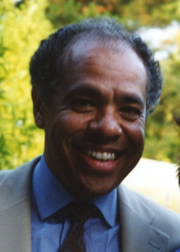

|

|
IN MEMORIAM
Enrico E. Jones
Professor of Psychology
Berkeley
1947—2003
Enrico Edison Jones died on March 29, 2003, in San Francisco, California, after a determined and courageous three-year battle with multiple myeloma. Born on November 25, 1947, in Munich, Germany, where his father was stationed in the military, and raised both in Germany and Rochester, New York, Rico was only 55 at his death. He left this world far too early, and at a time when he was enjoying a tremendous wave of research productivity and recognition.
A National Merit Scholar, Rico earned a bachelor’s degree in 1969, graduating cum laude in general studies from Harvard University. Awarded a Ford Foundation Fellowship for Doctoral Study, he completed his Ph.D. in clinical psychology in 1974 at the University of California, Berkeley. Rico was immediately appointed to the faculty in the department that trained him (a rare occurrence), and he was promoted through the ranks to full professor, ultimately becoming director of the Clinical Psychology Training Program and of the Psychology Clinic from 1994 to 1997. From 1997 to 2000, he served as a visiting professor for the summer research training program at the Department of Psychology, University College, London, England.
Rico was an outstanding exemplar of the researcher-practitioner model of clinical psychology. In addition to his internationally-renowned research program, Rico was a licensed psychologist, a trained psychoanalyst (graduating in 1992 from the San Francisco Psychoanalytic Institute), and in active clinical practice since 1982. He also held clinical appointments at the San Francisco Psychoanalytic Institute (1997-2000); the Department of Psychiatry and Langley Porter Psychiatric Institute, UC San Francisco (1982-96); and Mount Zion Hospital (1976-94). This fruitful marriage of research and clinical practice was to make him one of the foremost scholars of the psychotherapeutic process in the world.
Rico Jones’s earliest research on black-white personality differences and the influence of race on psychotherapy process and outcome championed a new field concerned with cross-cultural issues in mental health. With the publication of the classic Minority Mental Health (Praeger, 1982), a volume he edited in collaboration with his colleague, the late Sheldon Korchin, Rico provided this emerging field with the latest theory and research on minority group differences in attitudes toward mental health, assessment of symptoms, and therapeutic intervention.
As the first African-American professor in psychology at Berkeley, he was deeply committed to developing innovative courses in minority mental health, widening the diversity of the pool of doctoral applicants, and mentoring ethnic minority students in teaching, research, and clinical supervision. For his outstanding contributions to the professional development of ethnic minority graduate students, he was recognized in 1996 with the Kenneth and Mamie Clark Award from the American Psychological Association.
Rico Jones’s findings that the quality of the therapeutic alliance was not related to ethnic match between patient and therapist led him down a different but immensely fruitful research path. He turned his attention toward systematically measuring qualities of the working alliance between the therapist and patient and testing how this alliance forecast therapy outcome. In the Berkeley Psychotherapy Research Project, he pioneered the development of the Psychotherapy Process Q Set to code videotapes of treatment hours in psychotherapy and he made innovative use of the single case study to chart the dynamics of the mutually influencing interactions between therapists and patients over time. His empirical studies of psychotherapy and the underlying model of change are powerfully explicated in his widely acclaimed book Therapeutic Action (Jason Aronson, 2000).
Author of more than 60 works, Rico also served as associate editor (1990-96) of the Journal of Consulting and Clinical Psychology and was a member of the editorial boards of the Journal of the American Psychoanalytic Association, the International Journal of Psychoanalysis, and Psychological Issues. His awards included funding from the National Institute of Mental Health (1975-78; 1983-90); a National Science Foundation Fellowship to work at the Centre National de la Recherche Scientifique, Paris, France (1981); a Fulbright Grant (1981); a National Research Council Fellowship (1985); an award for best paper (1987) from Division 35 (Psychology of Women) of the American Psychological Association; a journal prize from the Journal of the American Psychoanalytic Association (1990); and his selection as the first Robert S. Wallerstein Fellow by the San Francisco Psychoanalytic Institute (2001).
Rico’s contributions to the Department of Psychology and to the Berkeley campus (support for ethnic diversity, the study of minority mental health, and the quantification of the psychotherapy process in real world clinical cases) have forever changed the landscape and will be remembered. To the fields of clinical psychology, psychiatry, and social work, Rico’s research and the continuing investigations of his students and colleagues provide both a vivid demonstration of how psychotherapy works and important tools for further inquiry.
Rico’s life outside psychology was full and passionate, especially enriched by a late-in-life marriage to Cheryl Yund Goodrich, also a psychoanalyst. He enjoyed reading, music, opera, and fine wine. He skied, lifted weights, and scaled mountains. Although Rico was an intensely private man, he was forthright with his opinions, stood steadfastly by his principles, and brought wit and humor to every exchange. His empty seat at the table leaves an enormous void.
Professor Jones is survived by his wife, Cheryl; his mother, Marta Jones of Maryland; sisters Ricarda Jones of Maryland, Ramona Moss of St. Thomas, Virgin Islands, Cornelie Jones of Buffalo, and Manuela Ruby Jones of Maryland.
Philip A. Cowan
Rhona S. Weinstein
Sheldon Zedeck